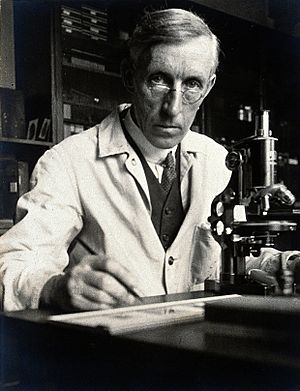James Peter Hill facts for kids
Quick facts for kids
James Peter Hill
|
|
|---|---|
 |
|
| Born | 21 February 1873 |
| Died | 24 May 1954 (aged 81) |
| Alma mater | University of Edinburgh |
| Awards |
|
| Scientific career | |
| Fields | Embryology |
| Institutions | University College London |
James Peter Hill (born February 21, 1873 – died May 24, 1954) was a Scottish scientist. He was an embryologist, which means he studied how living things develop from tiny beginnings, like eggs.
Contents
Early Life and Learning
James Peter Hill was born in Kennoway, Scotland. He went to school at the Royal High School, Edinburgh. Later, he studied at the University of Edinburgh. In 1903, he earned a special degree called a Doctor of Science. This showed he was very good at scientific research.
Discoveries in Australia
In 1892, Hill moved to Australia. There, he joined a group of scientists who called themselves "The Fraternity of Duckmaloi." They studied amazing Australian animals.
Studying the Platypus
One of the main animals they studied was the platypus. A platypus is a unique mammal that lays eggs, unlike most mammals that give birth to live young. Hill and his group learned a lot about how platypuses develop.
Researching Marsupials
Hill also spent time studying marsupials. These are animals like kangaroos and koalas. Marsupials carry their babies in a pouch. His work helped us understand more about these special animals.
Return to Britain
In 1906, James Peter Hill came back to Britain. He started working at UCL. He became a professor of zoology and helped manage the Grant Museum of Zoology.
Later, in 1921, he became the very first professor of embryology and histology at UCL. This was a big step for the study of how living things grow and the tiny structures inside them.
Awards and Special Recognitions
James Peter Hill received many awards for his important work.
- In 1913, he was chosen to be a Fellow of the Royal Society. This is a great honor for scientists in the UK.
- He gave a special talk called the Croonian Lecture in 1929.
- In 1940, he received the Darwin Medal. This award was given to him for all his research on marsupials and monotremes (like the platypus).
- He was also the President of the Anatomical Society of Great Britain and Ireland from 1939 to 1941.
Later Life
James Peter Hill retired from his teaching job in 1938. But he loved science so much that he kept working from home. He continued his research until he passed away on May 24, 1954.
 | Stephanie Wilson |
 | Charles Bolden |
 | Ronald McNair |
 | Frederick D. Gregory |

